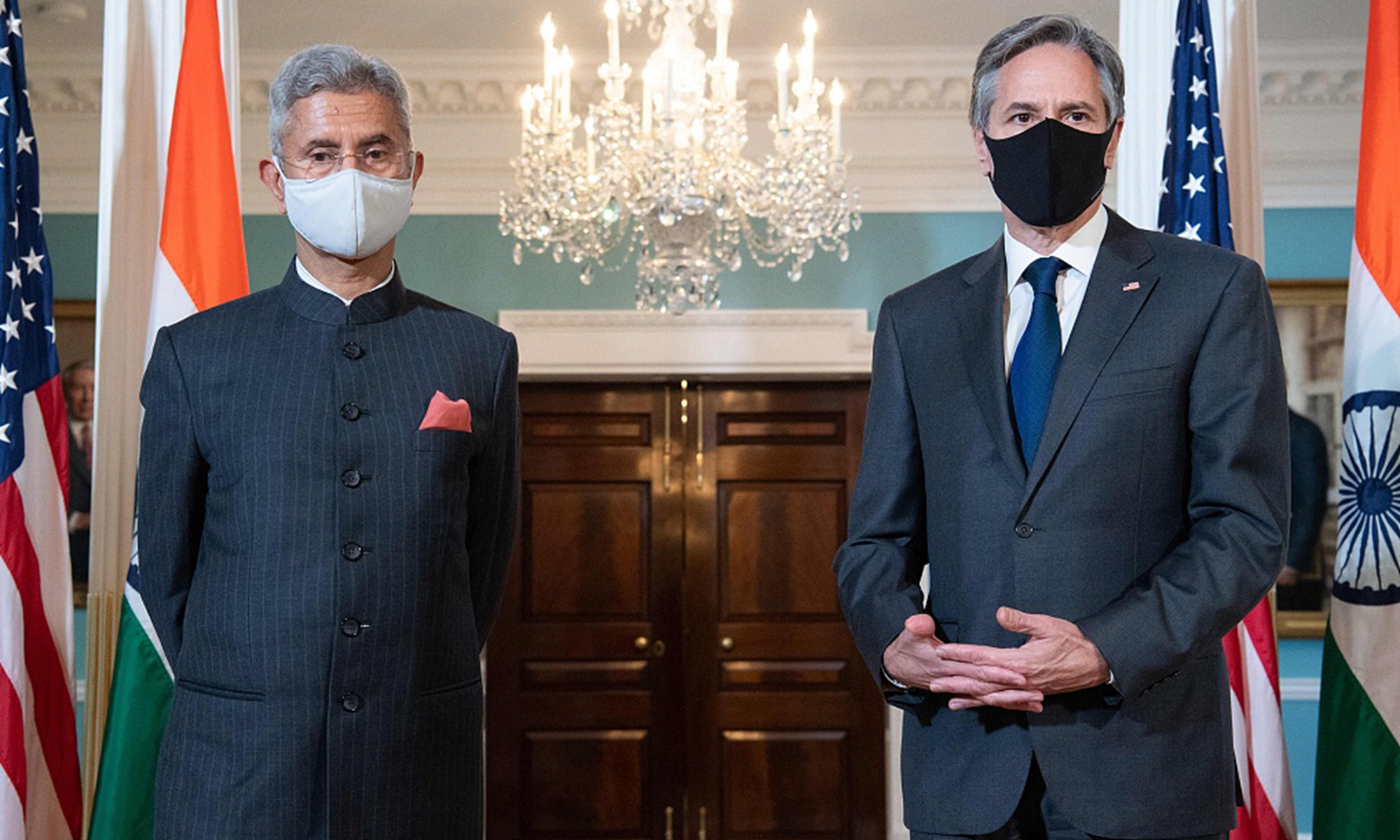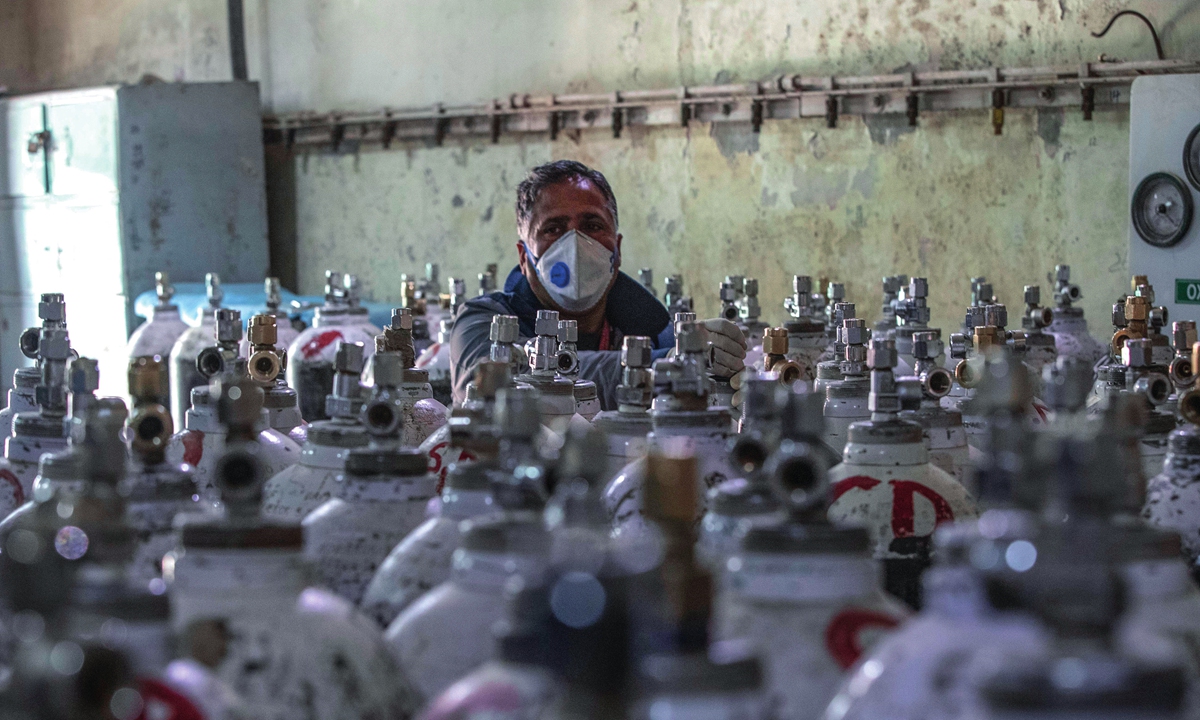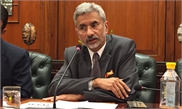Jaishankar’s US visit of fanfare gains little as Washington’s vaccine promises merely ‘blank checks’: observer

Jaishankar Blinken Photo:VCG
Mired by a devastating COVID-19 outbreak, Indian External Affairs Minister Subrahmanyam Jaishankar has spent the past week in the US, holding talks with US Secretary of State Antony Blinken and other top officials, in an attempt to seek help over vaccines. However, Chinese observers are not optimistic about gains from the visit, calling US promises likely "blank checks."
No matter how much convenience and assistance the US has promised to offer, India has to risk sacrificing its strategic independence,observers said. But New Delhi won't abandon difficult dialogue with China, nor is it panicking itself into a military alliance with the US, they said, noting that it means that the US won't put assistance to India as a priority. Instead, vaccine assistance will become Washington's chip to push New Delhi to confront China.
Jaishankar and Blinken held bilateral discussions on Friday afternoon at the US State Department, as the Indian foreign minister's trip to Washington drew to a close, Indian media outlet the Hindu reported Saturday.
The meeting, their second meeting after they met in London on sidelines of the G7 foreign and development ministers in early May, focused on vaccine cooperation between the two countries. While India is struggling with a shortage of vaccines, the US has the surplus vaccines and raw materials needed to manufacture them, media said.
Blinken assured Jaishankar that Washington would stand together with New Delhi in tackling COVID-19.
Many Indian media outlets have given the visit wide coverage. The Hindustan Times reported about the visit in an article titled "Stand with India in COVID fight: Blinken at meet with Jaishankar."
Long Xingchun, a senior research fellow with the Academy of Regional and Global Governance at the Beijing Foreign Studies University and president of the Chengdu Institute of World Affairs, told the Global Times on Saturday that Jaishankar's visit tried to create a "public stunt" of diplomatic achievement to appease public anger over the Indian government's anti-epidemic failures.
Although US President Joe Biden has pledged 80 million vaccines to the world, no update has indicated that India has received any commitments of vaccine supply from the US. At first, the US failed to provide timely help after the new wave of a severe and intensive COVID-19 outbreak hit India. In late April the US sent some relief materials to India under the pressure of the global public opinion.
The seemingly indifferent attitude from the US has led to many voices of discontent in India.
The Biden administration is actually still strictly following the "America First" policy especially on the anti-epidemic issue, Qian Feng, director of the research department at the National Strategy Institute at Tsinghua University, told the Global Times on Saturday. Qian noted that only when the US has launched sufficient vaccinations, can it provide vaccines to other countries.
The US may give its first doses to its allies and then perhaps India, Qian noted.
Long held similar views, noting that Jaishankar's visit to the US was aimed at elevating India's priorities for US aid. But American help is conditional and India has to intensify its confrontation with China in exchange for vaccine cooperation, Long.
However, Qian believes that India's policies toward China and the US follow two strategic lines. India will not greatly change its policy toward China just because the US requires it to do so, as India sees itself as a great power with diplomatic independence.
Citing an event hosted by The Financial Times and The Indian Express ahead of the visit where Jaishankar's remarks laid out India's geopolitical calculus in a world that is being shaped by two dominant powers - China and the US, Qian said it intended to tell Washington that New Delhi's foreign policy will continue to be in the best interests of its own country. This means that India will not give up its strategic independence or take sides.
This surely makes the US' promise to "stand with" India on vaccine cooperation merely a "blank check," Qian stressed.

An Indian hospital staff checks oxygen cylinders inside a hospital in Srinaga on April 25, 2021. Photo: AP
India reported 173,790 new cases and 3,617 deaths on Friday, lifting the total number to 27,729,247 and 322,512, respectively, data by Johns Hopkins University showed.
The Indian government on May 20 asked all states to declare dangerous fungal infection mucormycosis as an epidemic amid growing reports of the illness—also known as 'black fungus'—affecting hospitalized COVID-19 patients, leading to prolonged morbidity and death.
Indian media outlet the Economic Times gave a way out of the vaccine crunch in an article, saying as long as authorities are realistic, they can acquire vaccines from regional rival China.
In addition, during the visit, Jaishankar met US defence secretary Lloyd Austin, US trade representative Katherine Tai, National Security Adviser Jake Sullivan and director of national intelligence Avril Haines in Washington, media said.
Jaishankar said that he and Austin had a "comprehensive conversation about further developing our strategic and defense partnership" and exchanged views on contemporary security challenges.
With the Quad mechanism evolving, it is highly likely that Washington put forward further requirements to New Delhi during Jaishankar's visit, the observers said.
Liu Zongyi, secretary-general of the Research Center for China-South Asia Cooperation at the Shanghai Institutes for International Studies, believed that the US and India share the goal of not allowing China to continue to rise and Jaishankar and Austin could have discussed the containment of China's development in the Indo-Pacific region.
Previously, India, the US and several other countries have been speaking out for a free, open and thriving Indo-Pacific amid the backdrop of China's growing military power.


